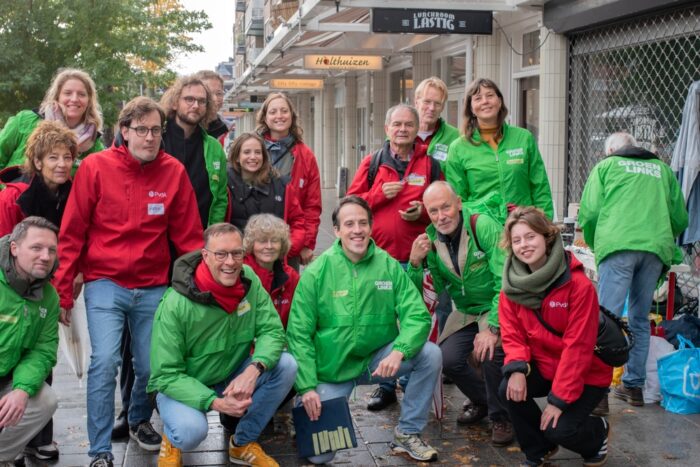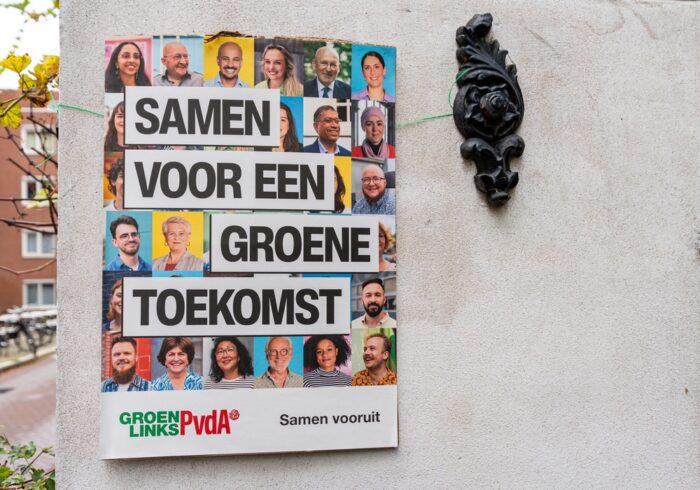Find all related Progressive Post
Progressive Post

By calling a snap general election three weeks ago, president Macron had wished to ‘clarify’ the political situation. He certainly did not get what he was hoping for. His ‘Ensemble’ coalition came second and lost 72 seats. His two political opponents – the New Popular Front (NFP, a left-wing coalition) and National Rally (RN, far right) fared well in many respects.
This was a strange election. The campaign was brisk and tense, and the first-round results set National Rally as the clear favourite to win the second round. Until the end, all opinion polls predicted a clear RN win, which, however, did not materialise on election night. The reason for this unexpected outcome is that the French electorate voted tactically and did so to avoid letting RN win the race. Had RN prevailed in the ballot box, Macron would have had to invite Jordan Bardella, the RN leader, to form a far-right government, a first in France since World War II.
Tactical voting is called the ‘republican front’ in France. It refers to the array of political parties in the mainstream that share common political values as opposed to fringe parties on the extremes. This voting reflex shows that a large majority of voters still regard RN as a party that represents a ‘threat to democracy’. Despite Marine Le Pen’s hard work to ‘de-demonise’ her party, voters still do not think RN is a mainstream party. In between the two rounds, the French press reminded voters of that reality by running stories about RN candidates with extremist backgrounds or a record of racist and antisemitic statements. The ‘republican front’ worked far better than expected and was key to the election outcome. Twice, Emmanuel Macron was elected to the presidency thanks to left-wing votes that helped him defeat Marine Le Pen in 2017 and 2022. Macron was ungracious enough to fail to acknowledge this support. Besides, in the run-up to the vote, he dismissed both opposing blocs as ‘extremes’. Yet, left-wing voters were very disciplined and voted in droves for ‘Ensemble’ candidates whenever their favourite candidate had pulled out from the race to avoid splitting the anti-RN vote. This explains why Macron’s coalition, with only 12 seats less than NFP, eventually did better than expected.
After the first round, a Bardella government seemed on the cards. In the end, the far right came in third position. It is a setback, but whether RN leaders will feel aggrieved at the result remains to be seen. By declaring that ‘our victory is only postponed’, with the 2027 presidential election in mind, Marine Le Pen may have a point. Despite being defeated, RN can point to new successes. With 143 MPs, RN has won 55 more seats, the biggest gains of all parties. It is now a competitive party in virtually all constituencies across France and appeals to all segments of the electorate in terms of class, gender and age. As for seats and vote percentage, RN is now, by far, the first party in French politics. The truth is that Macron’s dissolution took the far-right party by surprise: Jordan Bardella, the untested 28-year-old leader, was not ready to govern. Le Pen may also have secretly breathed a sigh of relief: running a minority government for three years may have been an unwelcome distraction from her fourth presidential bid. So, a defeat it may be this time round for RN, but certainly not a disaster. In the meantime, RN will bid its time in opposition and call out the ‘establishment parties’ of the left and right, which have jointly ‘stolen’ RN’s victory.
For the left, it was the sweetest of victory. Deeply divided until just a month ago, it managed a most unlikely come-back to win the election. NFP drafted a common programme in no time and ran a disciplined campaign. This paid off for several reasons. First, NFP’s programme advocates solid wealth redistribution through imposing a wealth tax on financial transactions, it is committed to raising the minimum wage, reversing Macron’s rise in the pension age from 62 to 64 or investing in public services. These areas have been neglected by Macron, so NFP’s left-wing Social Democracy struck a chord with the electorate. Furthermore, NFP is a broad left-wing coalition, not a ‘hard left’ one. It comprises radical left forces (such as Jean-Luc Mélenchon’s France Insoumise) but also moderate ones (such as former president François Hollande’s Parti Socialiste who, in another twist in the tale, was elected an MP in his old Corrèze constituency). During the campaign, the divisive and controversial Mélenchon was decisively sidelined by his coalition partners. Socialists, Greens and Communists all came out publicly against his appointment as prime minister, should the left win the election. Now that it has won, Macron should invite NPF to form a government. A left-wing prime minister should be a consensual figure who can unite the left, work with Macron and make necessary compromises with his/her political opponents. A younger and female prime minister would be a good move for the left. Marine Tondelier, the Green party leader, who ran an energetic and impressive campaign, would fit such a description.
President Macron did not accept Gabriel Attal’s resignation as incumbent prime minister. He knows that forming a government may take time, as several options may be tested: a minority left-wing government, then a national unity coalition government comprising left-wing moderates, Ensemble ministers and some Republicans. Macron’s dissolution has not clarified anything. The vote made him much weaker altogether, and there is no absolute majority in sight in the National Assembly. What is more, Macron has not weakened the far right. On the contrary, RN is even more of a threat than it was before the election. All in all, this snap election has provided anything but clarification. France is still in a severe political conundrum with months, possibly years, of political instability and crisis. If indeed France experiences a major political crisis, Marine Le Pen’s RN might present itself as the alternative to a ‘failed and corrupt political establishment’ offering political stability and order.
Photo Credits: Shutterstock.com/AntoninAlbert
| Cookie | Duration | Description |
|---|---|---|
| cookielawinfo-checkbox-advertisement | 1 year | Set by the GDPR Cookie Consent plugin, this cookie is used to record the user consent for the cookies in the "Advertisement" category . |
| cookielawinfo-checkbox-analytics | 11 months | This cookie is set by GDPR Cookie Consent plugin. The cookie is used to store the user consent for the cookies in the category "Analytics". |
| cookielawinfo-checkbox-functional | 11 months | The cookie is set by GDPR cookie consent to record the user consent for the cookies in the category "Functional". |
| cookielawinfo-checkbox-necessary | 11 months | This cookie is set by GDPR Cookie Consent plugin. The cookies is used to store the user consent for the cookies in the category "Necessary". |
| cookielawinfo-checkbox-others | 11 months | This cookie is set by GDPR Cookie Consent plugin. The cookie is used to store the user consent for the cookies in the category "Other. |
| cookielawinfo-checkbox-performance | 11 months | This cookie is set by GDPR Cookie Consent plugin. The cookie is used to store the user consent for the cookies in the category "Performance". |
| csrftoken | past | This cookie is associated with Django web development platform for python. Used to help protect the website against Cross-Site Request Forgery attacks |
| JSESSIONID | session | The JSESSIONID cookie is used by New Relic to store a session identifier so that New Relic can monitor session counts for an application. |
| viewed_cookie_policy | 11 months | The cookie is set by the GDPR Cookie Consent plugin and is used to store whether or not user has consented to the use of cookies. It does not store any personal data. |
| Cookie | Duration | Description |
|---|---|---|
| __cf_bm | 30 minutes | This cookie, set by Cloudflare, is used to support Cloudflare Bot Management. |
| S | 1 hour | Used by Yahoo to provide ads, content or analytics. |
| sp_landing | 1 day | The sp_landing is set by Spotify to implement audio content from Spotify on the website and also registers information on user interaction related to the audio content. |
| sp_t | 1 year | The sp_t cookie is set by Spotify to implement audio content from Spotify on the website and also registers information on user interaction related to the audio content. |
| Cookie | Duration | Description |
|---|---|---|
| CONSENT | 2 years | YouTube sets this cookie via embedded youtube-videos and registers anonymous statistical data. |
| iutk | session | This cookie is used by Issuu analytic system to gather information regarding visitor activity on Issuu products. |
| s_vi | 2 years | An Adobe Analytics cookie that uses a unique visitor ID time/date stamp to identify a unique vistor to the website. |
| Cookie | Duration | Description |
|---|---|---|
| NID | 6 months | NID cookie, set by Google, is used for advertising purposes; to limit the number of times the user sees an ad, to mute unwanted ads, and to measure the effectiveness of ads. |
| VISITOR_INFO1_LIVE | 5 months 27 days | A cookie set by YouTube to measure bandwidth that determines whether the user gets the new or old player interface. |
| YSC | session | YSC cookie is set by Youtube and is used to track the views of embedded videos on Youtube pages. |
| yt-remote-connected-devices | never | YouTube sets this cookie to store the video preferences of the user using embedded YouTube video. |
| yt-remote-device-id | never | YouTube sets this cookie to store the video preferences of the user using embedded YouTube video. |
| yt.innertube::nextId | never | This cookie, set by YouTube, registers a unique ID to store data on what videos from YouTube the user has seen. |
| yt.innertube::requests | never | This cookie, set by YouTube, registers a unique ID to store data on what videos from YouTube the user has seen. |
| Cookie | Duration | Description |
|---|---|---|
| COMPASS | 1 hour | No description |
| ed3e2e5e5460c5b72cba896c22a5ff98 | session | No description available. |
| loglevel | never | No description available. |


